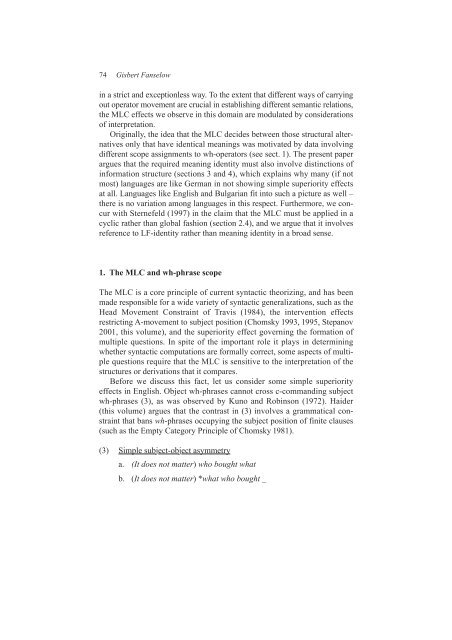Minimality Effects in Syntax · The MLC and Derivational Economy ...
Minimality Effects in Syntax · The MLC and Derivational Economy ...
Minimality Effects in Syntax · The MLC and Derivational Economy ...
Create successful ePaper yourself
Turn your PDF publications into a flip-book with our unique Google optimized e-Paper software.
74 Gisbert Fanselow<br />
<strong>in</strong> a strict <strong>and</strong> exceptionless way. To the extent that different ways of carry<strong>in</strong>g<br />
out operator movement are crucial <strong>in</strong> establish<strong>in</strong>g different semantic relations,<br />
the <strong>MLC</strong> effects we observe <strong>in</strong> this doma<strong>in</strong> are modulated by considerations<br />
of <strong>in</strong>terpretation.<br />
Orig<strong>in</strong>ally, the idea that the <strong>MLC</strong> decides between those structural alternatives<br />
only that have identical mean<strong>in</strong>gs was motivated by data <strong>in</strong>volv<strong>in</strong>g<br />
different scope assignments to wh-operators (see sect. 1). <strong>The</strong> present paper<br />
argues that the required mean<strong>in</strong>g identity must also <strong>in</strong>volve dist<strong>in</strong>ctions of<br />
<strong>in</strong>formation structure (sections 3 <strong>and</strong> 4), which expla<strong>in</strong>s why many (if not<br />
most) languages are like German <strong>in</strong> not show<strong>in</strong>g simple superiority effects<br />
at all. Languages like English <strong>and</strong> Bulgarian fit <strong>in</strong>to such a picture as well –<br />
there is no variation among languages <strong>in</strong> this respect. Furthermore, we concur<br />
with Sternefeld (1997) <strong>in</strong> the claim that the <strong>MLC</strong> must be applied <strong>in</strong> a<br />
cyclic rather than global fashion (section 2.4), <strong>and</strong> we argue that it <strong>in</strong>volves<br />
reference to LF-identity rather than mean<strong>in</strong>g identity <strong>in</strong> a broad sense.<br />
1. <strong>The</strong> <strong>MLC</strong> <strong>and</strong> wh-phrase scope<br />
<strong>The</strong> <strong>MLC</strong> is a core pr<strong>in</strong>ciple of current syntactic theoriz<strong>in</strong>g, <strong>and</strong> has been<br />
made responsible for a wide variety of syntactic generalizations, such as the<br />
Head Movement Constra<strong>in</strong>t of Travis (1984), the <strong>in</strong>tervention effects<br />
restrict<strong>in</strong>g A-movement to subject position (Chomsky 1993, 1995, Stepanov<br />
2001, this volume), <strong>and</strong> the superiority effect govern<strong>in</strong>g the formation of<br />
multiple questions. In spite of the important role it plays <strong>in</strong> determ<strong>in</strong><strong>in</strong>g<br />
whether syntactic computations are formally correct, some aspects of multiple<br />
questions require that the <strong>MLC</strong> is sensitive to the <strong>in</strong>terpretation of the<br />
structures or derivations that it compares.<br />
Before we discuss this fact, let us consider some simple superiority<br />
effects <strong>in</strong> English. Object wh-phrases cannot cross c-comm<strong>and</strong><strong>in</strong>g subject<br />
wh-phrases (3), as was observed by Kuno <strong>and</strong> Rob<strong>in</strong>son (1972). Haider<br />
(this volume) argues that the contrast <strong>in</strong> (3) <strong>in</strong>volves a grammatical constra<strong>in</strong>t<br />
that bans wh-phrases occupy<strong>in</strong>g the subject position of f<strong>in</strong>ite clauses<br />
(such as the Empty Category Pr<strong>in</strong>ciple of Chomsky 1981).<br />
(3) Simple subject-object asymmetry<br />
a. (It does not matter) who bought what<br />
b.(It does not matter) *what who bought _
















